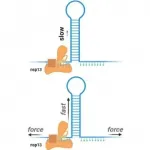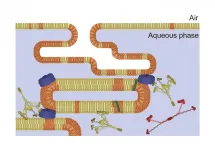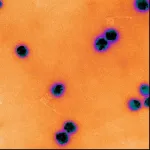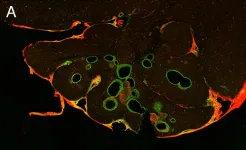Don't focus on genetic diversity to save our species
2021-02-23
(Press-News.org) Scientists at the University of Adelaide have challenged the common assumption that genetic diversity of a species is a key indicator of extinction risk.
Published in the journal PNAS, the scientists demonstrate that there is no simple relationship between genetic diversity and species survival. But, Dr Joao Teixeira and Dr Christian Huber from the University of Adelaide's School of Biological Sciences conclude, the focus shouldn't be on genetic diversity anyway, it should be on habitat protection.
"Nature is being destroyed by humans at a rate never seen before," says computational biologist Dr Huber. "We burn forests, over-fish our seas and destroy wild areas and it's estimated that about one million species are threatened with extinction, some within decades.
"Although researchers agree that this rapid decline of species numbers has to be stopped, how that's best tackled is still open to debate.
"Conservation geneticists consider genetic diversity as an important way to assess if a species is threatened by extinction. The view is that as long as individuals are genetically different from each other (having high genetic diversity), there will always be individuals with the right genetic makeup to survive under adverse conditions. On the other hand, if a species shows little genetic diversity, it's believed that the species is fragile and likely to become extinct."
Dr Teixeira and Dr Huber have compiled a wide range of evidence from laboratory experiments, field studies, and evolutionary theory which suggests a need for re-evaluation on the measurement and interpretation of genetic diversity for conservation.
"In this paper, we've shown that this simple relationship between genetic diversity and survival is often wrong," says population geneticist Dr Teixeira. "Most of the genetic diversity within a genome is 'neutral', meaning that it neither improves nor diminishes an individual's ability to survive or produce offspring. On the other hand, the genetic diversity that does affect survival is found in very specific regions of the genome and is not at all correlated with genome-wide genetic diversity.
"Researchers need to investigate for each species individually which genetic mutations allow the species to thrive and which mutations lead to diseases that can threaten the species. There is certainly no simple 'one-size-fits-all' measure of extinction risk."
The authors finally warn that, although genetics can play an important role in certain cases, fixating on genetic diversity shifts much-needed focus away from the much bigger problem: habitat destruction.
"Since the year 2000, wildlife habitat about eight times the area of the UK has been lost," says Dr Huber. "Without habitat, there is no wildlife. And without wildlife and the ecosystem services that humans rely on, we are ultimately risking our own security and survival here on Earth."
INFORMATION:
[Attachments] See images for this press release:

ELSE PRESS RELEASES FROM THIS DATE:
2021-02-23
COLUMBUS, Ohio - Scientists from around the world have published more than 87,000 papers about coronavirus between the start of the COVID-19 pandemic and October 2020, a new analysis shows.
Even given the importance of the pandemic, researchers were surprised by the huge number of studies and other papers that scientists produced on the subject in such a short time.
"It is an astonishing number of publications - it may be unprecedented in the history of science," said Caroline Wagner, co-author of the study and associate professor in the John Glenn College of Public Affairs at The Ohio State University.
"Nearly all of the scientific community around the world turned its attention to this one issue."
Wagner conducted the analysis with Xiaojing Cai from Zhejiang University in ...
2021-02-23
A team of researchers designed and manufactured a new sodium-ion conductor for solid-state sodium-ion batteries that is stable when incorporated into higher-voltage oxide cathodes. This new solid electrolyte could dramatically improve the efficiency and lifespan of this class of batteries. A proof of concept battery built with the new material lasted over 1000 cycles while retaining 89.3% of its capacity--a performance unmatched by other solid-state sodium batteries to date.
Researchers detail their findings in the Feb. 23, 2021 issue of Nature Communications.
Solid state batteries hold the promise of safer, cheaper, and longer lasting batteries. Sodium-ion chemistries are particularly promising because sodium is low-cost and abundant, as opposed ...
2021-02-23
ROCKVILLE, MD - Coronaviruses exploit our cells so they can make copies of themselves inside us. After they enter our cells, they use our cell machinery to make unique tools of their own that help them generate these copies. By understanding the molecular tools that are shared across coronaviruses, there is potential to develop treatments that can not only work in the current COVID-19 pandemic, but in future coronavirus outbreaks as well. Rockefeller University researchers in the labs of Tarun Kapoor and Shixin Liu, including postdoctoral associate ...
2021-02-23
ROCKVILLE, MD - A tenth of all intensive care unit patients worldwide, and many critical patients with COVID-19, have acute respiratory distress syndrome (ARDS). Therapeutic hypothermia, an intentional cooling of the body, has been suggested as a way to improve ARDS. New research by Chiara Autilio and colleagues in the lab of Jesus Perez-Gil at the Complutense University of Madrid shows not only how therapeutic hypothermia works in the lungs at the molecular level, but also why it could be successfully applied to ARDS. Autilio and her colleagues' work was published in Nature Scientific Reports in January 2021 and will be presented ...
2021-02-23
ROCKVILLE, MD - The remarkable genetic scissors called CRISPR/Cas9, the discovery that won the 2020 Nobel Prize in Chemistry, sometimes cut in places that they are not designed to target. Though CRISPR has completely changed the pace of basic research by allowing scientists to quickly edit genetic sequences, it works so fast that it is hard for scientists to see what sometimes goes wrong and figure out how to improve it. Julene Madariaga Marcos, a Humboldt postdoctoral fellow, and colleagues in the lab of Professor Ralf Seidel at Leipzig University in Germany, found a way to analyze the ultra-fast movements of CRISPR enzymes, which will help researchers understand how they recognize their target sequences in hopes of improving the specificity. Madariaga Marcos will present ...
2021-02-23
New compound targets neurons that initiate voluntary movement
After 60 days of treatment, diseased brain cells look like healthy cells
More research needed before clinical trial can be initiated
CHICAGO and EVANSTON--- Northwestern University scientists have identified the first compound that eliminates the ongoing degeneration of upper motor neurons that become diseased and are a key contributor to ALS (amyotrophic lateral sclerosis), a swift and fatal neurodegenerative disease that paralyzes its victims.
In addition to ALS, upper motor neuron degeneration also results in other motor neuron diseases, such as hereditary spastic paraplegia (HSP) and primary lateral sclerosis (PLS).
In ALS, movement-initiating nerve cells in the brain (upper motor neurons) and muscle-controlling ...
2021-02-23
According to a 2017 UCLA study, students with ADHD make up about 6% of the college student population and represent the most common type of disability supported by college disability offices. But are these students receiving enough academic support from their institutions? Despite ADHD being prevalent among college students, there has been little research focused on how having ADHD impacts the transition to college and ongoing academic success. Until now.
New research from George DuPaul, professor of school psychology and associate dean for research in Lehigh University's College of Education, and colleagues confirms students with ADHD face consequential challenges in succeeding and completing ...
2021-02-23
DURHAM, N.C. -- Younger, smaller trees that comprise much of North America's eastern forests have increased their seed production under climate change, but older, larger trees that dominate forests in much of the West have been less responsive, a new Duke University-led study finds.
Declines in these trees' seed production, or fecundity, could limit western forests' ability to regenerate following the large-scale diebacks linked to rising temperatures and intensifying droughts that are now occurring in many states and provinces.
This continental divide, reported for the ...
2021-02-23
In recent years, researchers have discovered ways to remove specific fears from the brain, increase one's own confidence, or even change people's preferences, by using a combination of artificial intelligence and brain scanning technology. Their technique could lead to new treatments for patients with conditions such as post-traumatic stress disorder (PTSD), phobias or anxiety disorders.
But while this technique is extremely promising, in some individuals it remains unsuccessful. Why are there such differences in outcome? Better understanding how the brain can self-regulate its own activity patterns would go a long way toward establishing the technique for clinical use. The researchers who spearheaded this technique have thus released a unique dataset ...
2021-02-23
Peer review/Experimental study/Animals
Propranolol, a drug that is efficacious against infantile haemangiomas ("strawberry naevi", resembling birthmarks), can also be used to treat cerebral cavernous malformations, a condition characterised by misshapen blood vessels in the brain and elsewhere. This has been shown by researchers at Uppsala University in a new study published in the scientific journal Stroke.
"Up to now, there's been no drug treatment for these patients, so our results may become hugely important for them," says Peetra Magnusson of the University's Department of Immunology, Genetics and Pathology, who headed the study.
Cerebral cavernous malformations (CCMs, also called cavernous angiomas or cavernomas) are vascular lesions ...
LAST 30 PRESS RELEASES:
[Press-News.org] Don't focus on genetic diversity to save our species





